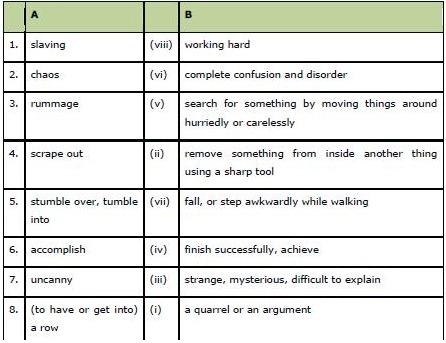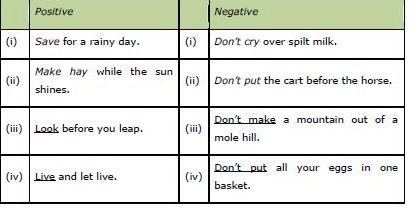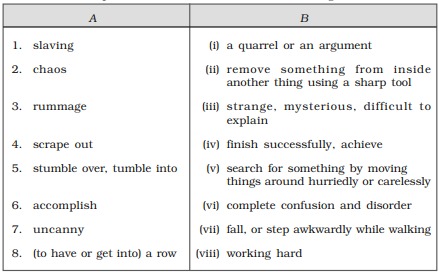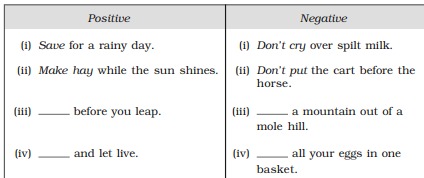Q.I: Discuss in pairs and answer each question below in a short paragraph (30 – 40 words).
1. How many characters are there in the narrative? Name them. (Don’t forget the dog!).
2. Why did the narrator (Jerome) volunteer to do the packing?
3. How did George and Harris react to this? Did Jerome like their reaction?
4. What was Jerome’s real intention when he offered to pack?
5. What did Harris say after the bag was shut and strapped? Why do you think he waited till then to ask?
6. What “horrible idea” occurred to Jerome a little later?
7. Where did Jerome finally find the toothbrush?
8. Why did Jerome have to reopen the packed bag?
9. What did George and Harris offer to pack and why?
10. While packing the hamper, George and Harris do a number of foolish and funny things. Tick the statements that are true.
(i) They started with breaking a cup.
(ii) They also broke a plate.
(iii) They squashed a tomato.
(iv) They trod on the butter.
(v) They stepped on a banana.
(vi) They put things behind them, and couldn’t find them.
(vii) They stepped on things.
(viii) They packed the pictures at the bottom and put heavy things on top. (ix) They upset almost everything.
(x) They were very good at packing.
Ans : 1. There are four characters in the narrative. They are Jerome (the narrator), George, Harris, and Montmorency (the dog).
2. The narrator volunteered to do the packing as he took pride in himself for his packing skills. It was one of those things that he felt he knew more about than any other person living.
3. George and Harris readily accepted Jerome's suggestion. George put on a pipe and spread himself over the easy-chair. Harris put his legs on the table and lit a cigar. No, Jerome did not like their reaction.
4. When Jerome had offered to pack, his real intention was that he would boss the job, and Harris and George would work under his directions. Then, he would push them aside every now and then, and teach them how to do it properly. That is why their reaction irritated him.
5. After the bag was shut and strapped, Harris asked Jerome if he wasn't going to put the boots in. Jerome knew that Harris was like that. He would not have said a word until he had shut and strapped the bag.
6. The "horrible idea" that occurred to Jerome a little later was if he had packed his toothbrush or not. He always forgot if he had packed his toothbrush or not.
7. After going through everything he had packed, Jerome finally found the toothbrush inside a boot.
8. Jerome had to reopen the packed bag Mice owing to his forgetfulness. Once he had to reopen the bag as he had forgotten to pack the boots. The next time, he unpacked when he realised he had
packed his tobacco-pouch in.
9. George and Harris offered to pack the hampers for carrying food. Harris said that they would want to start in less than twelve hours' time and therefore, it was better that he and George did the rest of the packing.
10. Statements (i), (iii), (iv), (vi) and (vii) are true.
Q.II: What does Jerome say was Montmorency’s ambition in life? What do you think of Montmorency and why?
Ans : Montmorency's ambition in life was to get in the way and get scolded. It felt that its day was not a waste if it could go anywhere where he was not wanted and be a perfect nuisance, make people mad, and have things thrown at its head. Its highest aim was to get somebody to stumble over it and curse it steadily for an hour. When it succeeded in accomplishing this, its pride in itself became unbearable.
Q.III: Discuss in groups and answer the following questions in two or three paragraphs (100 –150 words)
1. Of the three, Jerome, George and Harris, who do you think is the best or worst packer? Support your answer with details from the text.
2. How did Montmorency ‘contribute’ to the packing?
3. Do you find this story funny? What are the humorous elements in it? (Pick out at least three, think about what happens, as well as how it is described.)
Ans : 1. All three friends, Jerome, George and Harris prove to be bad at packing things. Jerome volunteered to do the packing as he took pride in himself for his packing skills. However, his packing skills were not up to the mark. He forgot to pack the boots; could not remember if he had packed his toothbrush or not; and accidentally packed his tobacco-pouch. On each of these occasions, he had to unpack everything he had already packed. When George and Harris began packing the hampers, they proved to be a lot worse than Jerome. They broke a cup; packed heavy things on top of light items; put things behind them and then couldn't find them when they wanted them; stepped on things; and upset almost everything.
2. Montmorency came and sat down on things just when they were about to be packed. According to the narrator, the dog had a fixed belief that whenever Harris or George reached out their hand for anything, it was its cold damp nose they wanted. It put its leg into the jam and disturbed the teaspoons. It pretended that the lemons were rats. It went into the hamper and killed three of them before Harris could hit it with a frying pan.
Harris blamed Jerome for encouraging the dog. However, Jerome said that a dog like Montmorency did not require any encouragement. It had a natural and original sin that was born in it, which made it do all such things.
3.This story is funny as it shows three adults making complete fools out of themselves. The bad packing skills of the narrator and his friends are on display in this story. The narrator, who prides himself on his packing ability, unpacks and repacks the same things three times, much to the amusement of his friends. When it is their turn to pack, they are worse than the narrator. Emulating his friends, the narrator simply sits back and watches them make a mess of everything. Things get more chaotic when the dog, Montmorency enters the picture. The narrator compares the things he unpacked for finding his toothbrush to the same state of chaos that existed when the world was created. On seeing all that George and Harry had managed to do with the butter, the narrator says that he had never seen anyone do more with one-and-two pence worth of butter. The narrator describes how Montmorency pretended that lemons were rats and got into the hamper and killed three before Harris could land a frying pan on him.




No comments:
Post a Comment